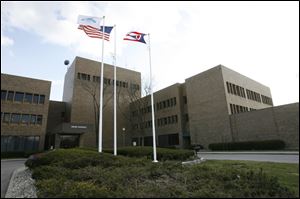
ProMedica defends merger bid
FTC says St. Luke's deal would shrink competition
2/11/2011
St. Luke's Hospital
Without naming St. Luke's, meanwhile, a 2008 agreement between ProMedica and Anthem Blue Cross and Blue Shield dictated the insurance company would face a 2.5 percent rate hike if it allowed any provider from western Lucas County into its network.
And the Maumee hospital - which had considered bringing an antitrust lawsuit against ProMedica in 2007 - more recently feared "significant repercussions" from ProMedica if it partnered with another organization, according to the Federal Trade Commission.
Those are some of the allegations the FTC made Thursday in U.S. District Court in West Palm Beach, Fla., about St. Luke's and ProMedica, which decided to join forces last year. Government regulators want to secure a preliminary injunction to keep the two separate while the FTC pursues its investigation into whether the deal is anti-competitive and will raise hospital rates in Lucas County.
"ProMedica's fixation on St. Luke's was not a secret. They knew exactly what was going on," said FTC attorney Matthew Reilly, who contended the government only needs to raise serious and substantial questions about the deal to obtain a preliminary injunction.
Lawyers for ProMedica, however, said the leader blamed for such aggressive tactics, Alan Brass, has retired. Indeed, St. Luke's decision to join ProMedica likely wouldn't have been an option even three years ago, when both had different leaders, said attorney David Marx Jr. of McDermott, Will & Emery of Chicago, which is representing ProMedica.
Although the FTC fears hospital rates will increase because of the agreement, what regulators have to show is that resulting costs will be higher than competitive rates, Mr. Marx argued.
ProMedica and St. Luke's have maintained the hospital must raise rates to survive financially.
Mr. Marx said government regulators need to look beyond market share figures, which show ProMedica would have a 58 percent stake in general acute-care inpatient services and 80.5 percent in obstetrics.
Employers and patients still would have alternatives if ProMedica did raise prices too high, especially since there is excess hospital capacity in Lucas County, he said.
"It's not a point where ProMedica can say, 'Take us, or you won't get treated,' " Mr. Marx said.
He added: "The complete truth is Toledo can't afford to support four independent hospitals and systems. It's just not big enough."
The preliminary injunction request was filed in U.S. District Court in Toledo. But the two-day preliminary injunction hearing wrapping up Friday is being held in West Palm Beach, from where Judge David Katz works part of the year.
Jamie Black, chairman of St. Luke's board, and Randy Oostra, ProMedica's chairman and chief executive, were among those present for the hearing Thursday.
Judge Katz is expected with coming weeks to decide on the FTC's preliminary injunction request, which is supported by Ohio Attorney General Mike DeWine but not Gov. Kasich. Regardless of the outcome, an administrative trial with up to 210 hours of testimony is slated to begin May 31 in Washington.
Over about seven hours yesterday, attorneys for the FTC and ProMedica took turns debating, among other things, whether St. Luke's was in dire financial circumstances.
While ProMedica conceded St. Luke's was gaining ground in some critical areas, such as increasing patient volume, it was unable to cover costs to care for patients - or renegotiate contracts with Anthem and Medical Mutual of Ohio, two major insurers, said Amy Carletti, an attorney for McDermott, Will & Emery.
"St. Luke's couldn't cover the cost of care for its services," she said.
In 2009, for example, St. Luke's lost more than $2,000 from Medical Mutual and $1,800 from Anthem for each inpatient, Ms. Carletti said. St. Luke's rejoined Anthem's network in 2009.
Judge Katz questioned whether proposals by both ProMedica and Mercy to build hospitals in St. Luke's back yard also had a negative affect on its financial outlook. St. Luke's joining ProMedica would eliminate the need for the chain to build in Arrowhead Park, he noted.
Mr. Marx said not building that 60-bed hospital and not adding onto Flower Hospital in Sylvania to accommodate private patient rooms are two benefits to ProMedica from adding St. Luke's. Combined, those construction projects would cost $115 million to $130 million, he said, and the agreement also allows for an estimated $27 million to $30 million in savings despite the FTC's assertions otherwise.
Along another line of dispute, the FTC's Mr. Reilly said the government believes obstetrics should be considered separate from other inpatient services because the only other Lucas County competitor in that area is Mercy. ProMedica could try to negotiate obstetrics rates with insurers separately, he said.
The larger the hospital market share is in Lucas County, the higher rates are, and employers and others are concerned by that, Mr. Reilly said. One insurer expects St. Luke's rates to increase 20 percent to 30 percent in three years if the deal is allowed to stand, he said.
"Market shares do matter, and market share are a very strong predictor of pricing in Lucas County," Mr. Reilly said.
Contact Julie M. McKinnon at: jmckinnon@theblade.com or 419-724-6087.